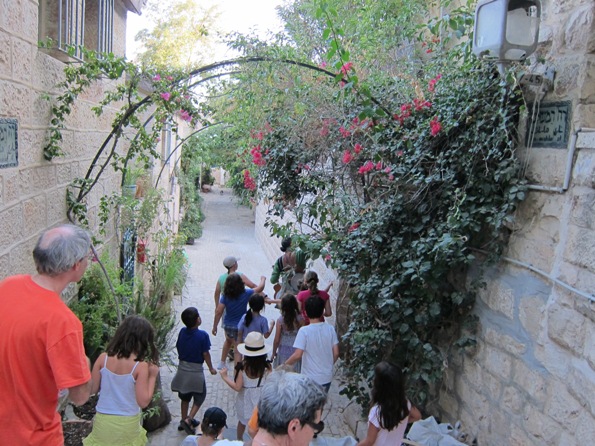
Puppetry is one of the most radical forms of theatre I have seen in recent years in Israel. Without fanfare, often working with the simplest of materials, they easily vanquish the demonic assumptions of popular theatre and “what works.” Creating theatrical worlds – beautiful, funny, subversive and sometimes all three at once – imbued with a sense of wonder, they speak to audiences of all ages.
The International Festival of Puppet Theater took place in Jerusalem last week from August 14 – 19, 2011. The festival included 38 different productions, Israeli and international. Had there been “world enough and time” I would have been delighted to see more, the selection of Train Theater productions I saw revealed different approaches and use of stage and materials, yet all five shows had one trait in common: the audiences were spellbound. From the four year olds and their parents in the intimate setting of the Train Theater in the Koret Liberty Bell Park (Gan HaPa’amon) to the artsy crowd that gathered for the late-night adults only performance, and the 60-strong multi-age group that wandered through the picturesque passages of the Yemin Moshe neighborhood, the air shimmered with the hush of rapt attention.
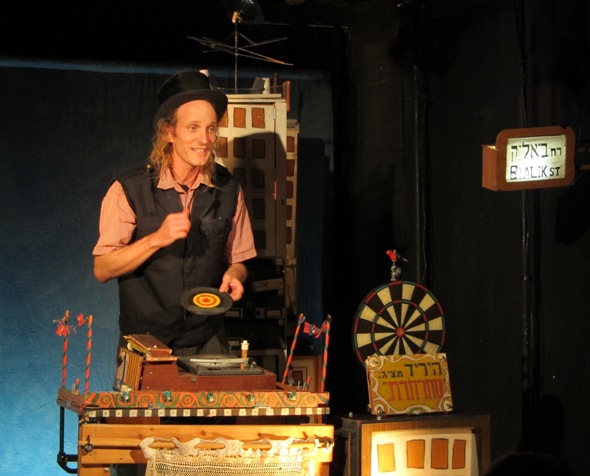
My journey began on the first day of the festival at the Train Theater, now celebrating its 30th anniversary, with Far Over the Sea, directed by Alina Ashbel. The set recreates a Tel Aviv street scene with recycled materials, the sign saying “Bialik Street” lets us know where we are, geographically and conceptually. Both the look and text of this piece reflect a very contemporary sensibility. Although Haim Nachman Bialik (1873 – 1934), is recognized as Israel’s national poet, most Israeli schoolchildren would not recognize his works, beyond a few songs that have become part of the playground folk tradition. His poetry and short stories have traditionally been part of the high school literature curriculum, but literature has all but disappeared from schools. Bialik, while a founding pillar in the Israeli literary canon, has become less of a writer whose works are actually read, and more of a cultural marker or sign post.
The disarming lack of pretense caught my attention as Shahar Marom greeted the audience from amid the set, explaining that it was constructed from discarded objects he had found on the streets, and then announced: “Now I am going to enter my show.” Like the set, magic is constructed, not found. He began by pushing a cart on the tiny stage, calling out “cupboards, drawers, old refrigerators,” like the ubiquitous alte-zachen (roughly: old stuff) peddlars who can still be sighted even in the urban chaos of Tel Aviv. Giving the Hebrew words Bialik’s Ashkenaz intonation, Marom gently led the audience on a search for the poems, acknowledging the distance between Bialik’s Hebrew and their everyday speech with explanations woven into the fabric of the story. Reviving the children’s poems of yesterday with loving attention, and creating endearing creatures from an unlikely collection of objects including dial telephones and hot water bottles, inviting reflection on what we choose to discard.
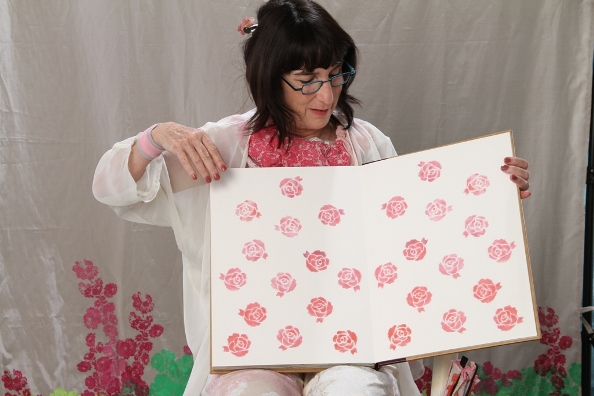
Rose-bud, by Amalia Hoffman and Naomi Yoeli, is a confection from the enchanted realm of bedtime stories, paper dolls and pop-up books, sweet and light as a fairy kiss. Retelling the tale of the beloved daughter of the King and Queen and the uninvited fairy’s revenge in pink and white; connecting the tale to the nighttime rituals of three sisters who loved drawing, stories and fairies. From the rather helpless queen who cries big blue paper tears, to the rather wickedly amusing angry fairy and the gallant prince and his horse onstage (no spoilers here, I won’t tell how she did it, but it did elicit an amazed whisper from a young audience member “oh, a real horse”), there is a nice mix of humor, music and magic with a large, illustrated book at the center of the story. Hoffman’s delicate drawings come to life in Yoeli’s hands, and the traditional storytelling is enhanced by consultations with the audience who are eager participants in the story.
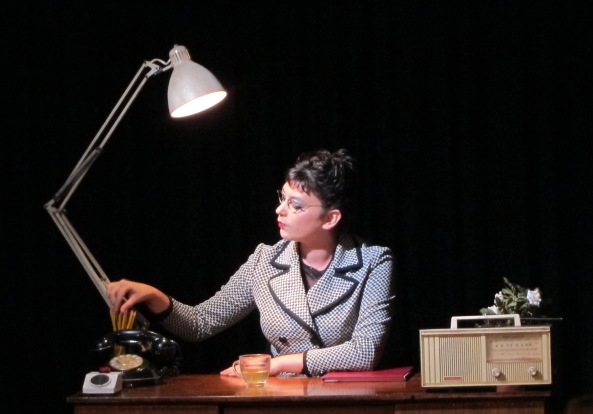
Employing similar materials – a book with pop-up art and paper-doll like figures and masks – Yael Rasooly creates an entirely different effect in Paper Cut, a puppet show with a retro touch that is most definitely for mature audiences. Paper Cut harks back to the golden days of black and white cinema fantasies, when men were men and women were…secretaries, submissive second wives, all those who live to serve. Rasooly is actress and puppeteer, setting the scene with her pre-show: buttoned up and decked out in checked jacket, obligatory bun and black plastic framed glasses, she is already on the job, making sure her pencils are all perfectly sharp, with only her red lipstick to hint at the fires that burn within. It’s a fun frolic, especially for film buffs. Rasooly takes the fantasy all the way and then some, on an imaginative tour that stops at all the iconic vintage cinema scenes before taking a detour to its somewhat surprising dénouement.
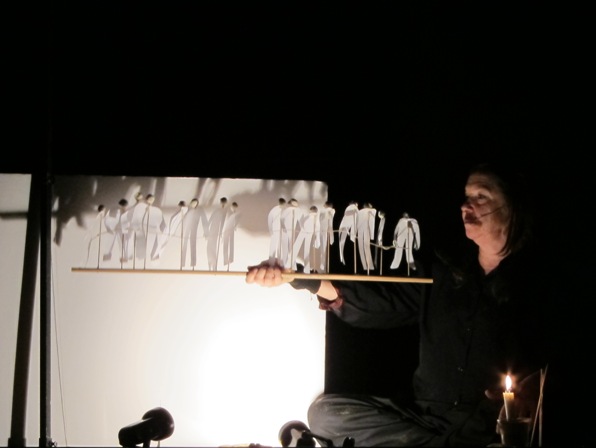
Patricia O’Donovan’s A Touch of Light is a moving work that pierces the heart to fill it with radiance. A candle glowing in the darkness illuminates shadow puppets, drawings, and figures made of paper, as O’Donovan’s artistry imbues the story of Louis Braille with the playful laughter, the pleasure that can be found in books, and the joy of insight. Without attempting to deny the pain and frustration of losing his eyesight, Louis’ story is told using simple words and creative methods. O’Donovan conveys even complex concepts such as echolocation in a way that even the youngest audience members can immediately grasp. As the young Louis sits in the village square, each person that passes is accompanied by a different sound, without saying a word, O’Donovan has explained that Louis knows the world around him through sound. Giving voice to the different characters with warmth, mischief and sensitivity to intonation that many stage actresses would do well to emulate, O’Donovan brings the story to life. Ultimately, however, it is the visual brilliance of this work that takes the breath away, especially in one pivotal scene that translates Louis’ moment of epiphany into visual expression, creating onstage magic that is real and makes the spirit soar.
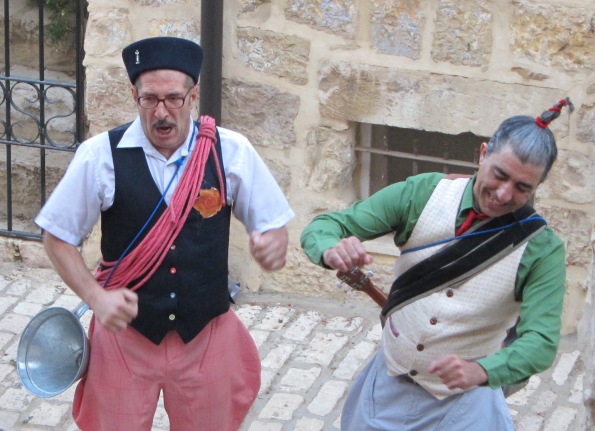
The Dream Trackers is at once the most ephemeral and most physical of the shows I saw, part of the Public Works project of the Train Theater, taking place in the Yemin Moshe neighborhood of Jerusalem. A delightful feat of the imagination, up to 60 people can sign up for the course taught by the two eminent dream trackers Jack Shvili and Avraham Cohen, both students of the famous Professor Pyjama. While I cannot reveal the secrets of the trade acquired en route, the exceptional experience not only enchanted the participants (ranging in age from about 3 to 63), but attracted people passing by who stopped to listen, drawn into the fantasy created through words, song, movement and creative props. “What is a dream without a dreamer?” sang the two dream trackers, suggesting the most radical statement of all: magic is in us and all around us, available always in our minds and hands, waiting to be found.
Far Over the Sea
Direction: Alina Ashbel
Set design, objects, light and performance: Shahar Marom
Music: Igor Krutogolov
Artistic consultation: Naomi Yoeli, Marit Benisrael, Shirly Marom
Paper Cut
Creation and performance: Yael Rasooly
Writing: Yael Rasooly, Lior Lerman
Design: Yaara Nirel, Lior Lerman
Sound design: Binya Reches
Lighting design: Adam Yakin
A Touch of Light
Writing, direction and design: Patricia O’Donovan
Performance: Patricia O’Donovan
Music: Rachel Yatzkan
Rose-bud (based on The Sleeping Beauty)
Design and illustration: Amalia Hoffman
Adaptation and story-telling: Naomi Yoeli
Costume design: Einat Amir, Hagit Karkovski
Music: Mike Dani
Third eye: Marit Benisrael
The Dream Trackers – Public Works Tour Shows Yemin Moshe
Direction and design: Amit Drori
Writing: Shmil Maayan
Performance and Manipulation: Jack Shvili, Avraham Cohen
Costume design: Valia Piratinoff

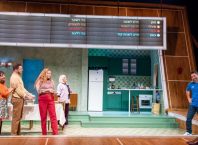
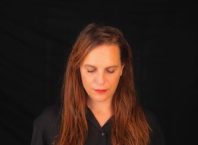



J’aime votre culture et sa Music fière de connaitre votre Pays c’étais mon souhait de l’enfance et je je suis àrrivée en avril 2011 je garde des Bons souvenir innoubliable partout ou je suis passé des Kibouts qui nous ons àcceuillis et nous ons réservé une surprise viva Israël et ses Coture enciennes il le féra mais plus!
Garde les avec afféction.
Merci beaucoup
Comments are closed.